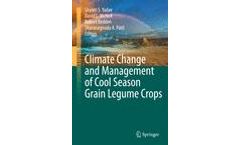Refine by
nutrient-management books
6 books found
Emphasis in agricultural production has shifted from mere quantity to quality products. Practical experience and scientific investigations have shown that, of the various culture measures, balanced fertilization above all exerts a considerable influence on the quality of agricultural products. Simply adding more of what the crop has already absorbed to capacity is unproductive, expensive, ...
Utilities work with regulators to treat wastewater to levels that protect human health and ecosystems. Water quality criteria and permits are based on scientifically defensible and shared understanding of sources of pollutants in a watershed, as well as treatment capabilities and costs to control these in the aquatic environment. The national discussion of nutrient impacts on water quality ...
Biofertilizers are important components of integrated nutrient management. They are cost effective, ecofriendly and a renewable source of plant nutrients to supplement chemical fertilizers in sustainable agricultural systems in India. ...
This book covers all aspect of legume production management technologies, plant ecological response, nutrients management, biological nitrogen fixation, molecular approaches, potential cultivars, biodiversity management under climate change. Also covered are various aspects of legume management under climate ...
Food security in West Africa is challenged by complex issues, including rapid population growth, exploitation of nonrenewable resources, and chronic low soil fertility, but in this text experts from world agricultural institutions share their work to provide solutions. Topics covered include soil microorganisms and organic matter, indigenous knowledge, new cropping systems, use of nonorganic ...
Rice is the major staple food in Asia, and food security means rice security for most Asians. By the year 2025, we need to produce about 60% more rice than we do today to meet the growing demand. Efficient use of inputs is vital to safely produce the additional food from limited resources with minimal impact on the environment. This book reviews emerging knowledge-intensive technologies and ...



